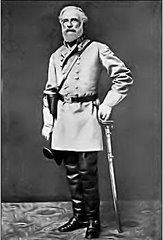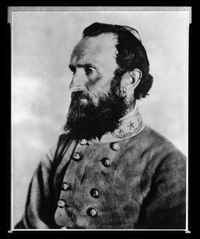One of the most misunderstood events in American history is the American "Civil War." In fact, the "Civil War" was no civil war. The classic textbook story of the case goes something like this: The South had slaves, and the North wanted to end slavery. The South rebelled and waged war with the North. But they did not really secede because secession is illegal. Abraham Lincoln saved the Union without unnecessary violence. But that is VERY far from the way the story actually goes.
We should ask ourselves what caused the war, how the war went and how it was carried through, and what the effects of the war were, or are. There is little doubt that slavery was an issue, and in fairness, it must be addressed to a degree. But let us remember that the victorious North wrote the historical accounts, making our "history" very bias.
The war was largely a cultural war. It was not a war fought only over slavery, but a war fought between two different cultures. The cultures were different in terms of religion, politics, economics, custom, philosophy, etc. Essentially, they were different in almost every way imaginable. The North and South are different today, but not nearly as much as they were then.
Slavery was an issue that had been going on for a long time. The slave trade in Africa had been going on for perhaps thousands of years. It made eventually made its way to England, and eventually to Western Civilization. It was an issue that the founders pondered on. We would think that because our founders thought so highly of natural law theory, and liberty, that they would have outlawed such an act in the nation. But we must remember that is was considered the norm at the time, and many early Americans wanted to take slaves and treat them right, perhaps even showing them the Christian Gospel.
American slavery acutally began in the North. But as the two cultures grew more and more different, slavery became more indigenous in the South. The South was largely agriculturous, and needed slaves much more than the largely industrious North. Slavery was an issue that separated the North and the South.
But it was not the only issue. New Orleans was shaping out to be a powerful American city. I was close to the Gulf of Mexico and close to the Mississippi River. It was central to both the East and West of the country. But it was a southern city. The North did not like the South becoming more geographically dominant to the once dominant North.
The South was good for producing cotton and the like. A good economic trade system was going on between England and North and South United States. But a disproportionate tariff was placed on imported goods. This hurt the South's economy because they would be forced to buy at a more expensive price, and because it forced others to buy from somewhere other than the South, given that the South would raise their prices to drown out the tax. The South saw this as unkind, unconstitutional, and unfair. They saw it as Central Aggression that benefited the North at the expense of the South.
The South was largely ridiculed due to growing in line with the romantic movement and becoming much more religious oriented. The North was more intellectually oriented as opposed to the South's emotionalism. The South was sensitive to their pride and to any outer aggression or intolerance. The South wanted a smaller government, particular the Central Government. They saw the Central Government as drifting from the Constitution.
The South could not stand Abraham Lincoln. He did not even receive a single vote in the South when he ran for President. Yet he one the election. The South saw him as a tyrant, and a hater of the South. Lincoln probably did not hate the South as much as other Northerners did, or as much as the South thought he did. But Lincoln was not quite the Saint or martyr we make him out to be.
Lincoln once supported secession, but changed his mind when the South seceded. Lincoln was not quite the saviour to the slaves as we think. Lincoln did not want the slaves in America, but he wanted the slaves sent back to Africa. Lincoln was a political flip-flopper (like politicians today perhaps!). When Lincoln was elected President, the South immediately seceded.
Secession is legal. The Constitution never addresses the matter, at least not directly, leading us to believe that the Central Government may not interfere on the issue. But the Central Government did interfere. The Central Government, under Lincoln, waged war on the seceding South.
Therefore, this was a war against two nations - the United States of America and the Confederate States of America. If this was one nation, as Lincoln often suggested, then this war would be unconstitutional, being that the Central Government of the United States waged war on a particular section of its very country! This is not only unconstitutional, but is flat out absurd! And why would or should Lincoln want to wage war on the South if he loved them so much and just wanted them happily ever after in the Union?
But Lincoln waged war on the South. Not only to punish those who own slaves, but to completely demolish the South. The North Burnt churches, houses, and killed innocent people. Slavery was used as an emotional argument to Northern Abolitionists to justify the war. But slavery was not as rampant in the South as we think. Most Southerners did not own slaves, and most of who did owned very little. Very few people in the South owned over ten slaves. And there were still some people in the North who owned slaves anyway.
A point can be made that the South should not have seceded. But it is absurd to think that the South was the "bad guys" in this war, and the North was the heroes. This was no "Civil War." This was a war for Southern Independence fought against Northern Aggression. A Civil War is a war fought between two different parts of one nation seeking the same government. But this was for Southern Independence. The South had - and wanted to keep - their own nation. They drafted a Constitution as did the founders of the United States. It was very similar, simply leading out the "general welfare" clause, and interestingly enough, outlawing the slave trade. After secession, the South should have been left alone, or mildly encouraged to join the Union.
But the North won the war, and in doing so, was able to show dominance and write history. The North began winning many votes by the emotional argument used on the slaves. The North with the help of the Central Government, made the South submit to many of their ways. Reconstruction was not just cleaning up the economy after the war, but reconstructing the South. Much terror against the South still continued. Robert E. Lee himself said that if he knew that the South would have been treated the way they were after the war, he would not have surrendered, but would have fought to the last man.
I do not attempt to claim perfection to the South. They probably should not have seceded, at least not at the time that they did. Slavery, except for rare exceptions, is wrong, and contradicts the founders view of natural law and natural rights. There were good people in the North, and good people who fought for the North, and some people in the South with bad intent. But there were many things that the South stood for that were good, and many things that the North stood for and did that were absolutely immoral. In the least, I hope this provides balance to a largely unbalanced issue.
But don't just take my word. Here are some interesting links:
http://youtube.com/watch?v=x0nCil3D1ZU
http://www.historycooperative.org/journals/jala/14.2/vorenberg.html
http://quotes.liberty-tree.ca/quote_blog/Abraham.Lincoln.Quote.C318
http://www.geocities.com/mark_willey/civlwar.html?200720
Subscribe to:
Post Comments (Atom)










No comments:
Post a Comment